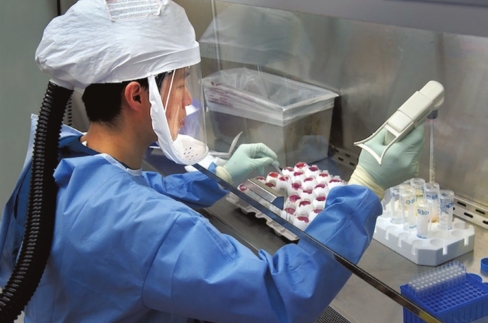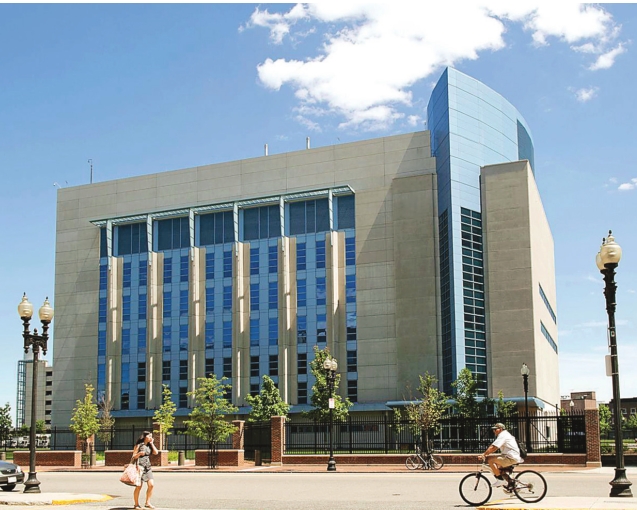
Research from Boston
University on genetically modified COVID-19 strains sparked an uproar after a headline from The Daily Mail misleadingly highlighted the new pathogen’s 80% fatality rate.
Boston University (BU) has found itself on the defensive after the UK-based media outlet published an article on research from BU’s National Emerging Infectious Diseases Laboratories (NEIDL) in the South End.
The story accuses the researchers of engineering a hybridized strain with an 80% fatality rate, which while true leaves out how that’s actually lower than the 100% fatality rate of the unadulterated strain. Boston University’s October 17 article rebuking The Daily Mail’s reporting as “false and inaccurate” was written using that comparison to standard COVID-19.
The authors of the NEIDL study did create a new virus strain by adding Omicron’s spike protein to the original “wild” SARS-CoV-2.
By comparing the new
hybrid strain to the original, researchers hoped to test whether the
spike protein was the key to Omicron’s infectiousness, first in cultured
human cells and then in mice specifically bred for susceptibility to
the disease.
The lowered pathogenicity of the new strain indicates the spike protein alone wasn’t responsible for Omicron’s potency.
While
it’s true that researchers didn’t technically create a virus more
effective than the base “wild” strain they modified, the new chimeric
strain was significantly more deadly than the Omicron variant the spike
protein was taken from, which had a 0% fatality rate in the same mouse
breed.
The new strain
also produced more infectious particles and infected lung tissue better
than Omicron, though still less than unhybridized COVID-19.
Research
on highly infectious diseases conducted in dense urban neighborhoods
has been under increased scrutiny since the start of the pandemic.
Despite
heavy pressure from the Chinese government and repeated premature
declarations of the lab leak hypothesis’ death, no conclusive evidence
has been unearthed of COVID-19’s origin from a natural reservoir.
That
ambiguity has fueled debate over the safety of conducting risky
biomedical research in population centers, especially in a city with as
much biotech investment as Boston.
The
NEIDL, where this study was conducted, are Biosafety Level (BSL) 4
labs, dealing with the most dangerous pathogens and subjected to the
highest level of scrutiny and safety protocols. The study was done in
its BSL-3 facilities, designed for potentially lethal airborne
pathogens. BSL-4 equipment is typically reserved for lethal airborne
diseases that have no treatment.
Gain-of-function
studies, where researchers genetically modify pathogens to be more
dangerous to study their behavior, have garnered particular scrutiny,
but BU still denies that the study was gain-of-function research at all.
Some members of the scientific community feel there isn’t enough
consideration being given to this kind of research’s risks in highly
populated environments. The Cambridge Working Group is an organization
with almost 400 members started in 2014 to demand greater caution with
engineered pathogens.
“Incidents
have been accelerating and have been occurring on average over twice a
week with regulated pathogens in academic and government labs across the
country. Risks with newly created ‘potential pandemic pathogens’ raise
grave new concerns. An accidental infection in such a setting could
trigger outbreaks that would be difficult or impossible to control,”
reads its 2014 founding charter.
The
Boston Public Health Commission (BPHC) confirmed that it conducts risk
analyses prior to approving any proposed BSL-3 or -4 projects. All
recombinant DNA research is subject to BPHC authority, although BSL-2
projects working with genetic modification weren’t included in those
risk analyses.
No blanket prohibition on gain-of-function research exists, and the NEIDL study was apparently deemed worth the risk.
“Sometimes
a single line taken out of context can lead to explosive headlines
across tabloid news, but this study is still a bit worrying to me
because the outcome of such a virus leaking into the Boston community is
unpredictable,” wrote Alina Chan, scientific advisor at MIT and
Harvard’s Broad Institute as well as the author of the book “VIRAL: The
Search For The Origin Of COVID-19,” on her social media. “Studies like
this highlight how undemocratic scientific research can be. The people
living here (myself included) were not consulted on whether this type of
experiment should be conducted in our neighborhood. Yet if a virus were
to leak, we would all face the consequences.”